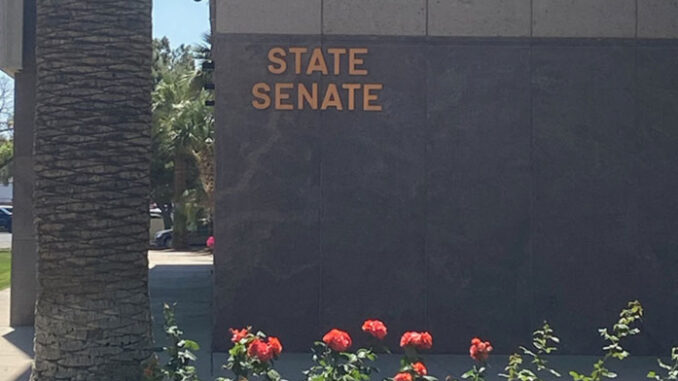
by Jonathan Eberle | Aug 1, 2025 | News
By Jonathan Eberle |
A new Arizona law banning the use of privately funded employees in state agencies is drawing national attention as lawmakers seek to curb outside influence in public institutions.
Signed into law last month under Senate Bill 1735, the new law prohibits any state agency from employing officers or staff whose salaries are paid with private funds. The legislation aims to increase transparency and reduce what supporters call “lawfare for hire” — the practice of embedding privately paid attorneys or staff within government offices to influence public policy.
“This is about drawing a clear line between public service and private influence,” said Senate President Warren Petersen. “Arizona will not tolerate lawfare for hire, where outside billionaires fund shadow attorneys to quietly steer public policy behind closed doors.”
The law defines “private monies” as any funding not appropriated by a federal, state, or local government — including funds from nonprofit organizations, foundations, universities, individual donors, or advocacy groups. Limited exceptions are made for law enforcement, environmental quality staff, and public universities, where oversight frameworks are already in place.
The law comes amid broader national scrutiny of efforts such as the NYU Environmental Fellowship, which places attorneys funded by Bloomberg Philanthropies in state attorneys general offices to work on climate-related litigation. Critics argue these “Special Assistant Attorneys General” blur the lines between public and private interests, especially when pursuing legal strategies aligned with specific political ideologies.
Supporters of the new Arizona law say the measure enhances legislative oversight and keeps public servants accountable to the taxpayers who fund their salaries — not to out-of-state advocacy groups or wealthy individuals.
“Taxpayers deserve to know who’s working on their behalf, and who’s really pulling the strings,” Petersen said.
States like New York, Washington, and Illinois have welcomed privately funded legal fellows into public agencies, particularly in areas related to environmental enforcement. But Arizona’s move places it among a smaller group of states seeking to restrict such arrangements in the name of governmental independence.
Jonathan Eberle is a reporter for AZ Free News. You can send him news tips using this link.

by Jonathan Eberle | Jul 31, 2025 | News
By Jonathan Eberle |
Arizona Senate President Warren Petersen announced a series of key leadership changes Monday, reshuffling committee chairmanships as the Legislature continues to press forward with its conservative agenda.
Senator John Kavanagh will step down as Chairman of the influential Senate Appropriations Committee to focus full-time on his new position as Senate Majority Leader. Replacing him is Senator David Farnsworth, who will now lead the newly combined Appropriations & Transportation Committee.
Farnsworth, a longtime advocate of limited government and responsible budgeting, is expected to bring a fiscally conservative approach to the role. His leadership will influence critical decisions on state spending, infrastructure investment, and resource allocation.
In turn, Senator Hildy Angius will take over Farnsworth’s previous post as Chair of the Senate Education Committee. Angius will helm legislative efforts concerning Arizona’s K-12 and higher education systems, with a particular focus on school choice and parental rights—issues that remain a top priority for Senate Republicans.
“These appointments strengthen our chairmanship bench and keep our conservative agenda focused where it belongs – on the needs of everyday hardworking Arizonans,” said President Petersen in a statement. “I’m confident these committees will continue to be led with integrity, discipline, and common sense.”
The realignment signals a tightening of Senate leadership around core priorities such as budget discipline, infrastructure modernization, and education reform, as lawmakers gear up for the next legislative session.
Jonathan Eberle is a reporter for AZ Free News. You can send him news tips using this link.

by Jonathan Eberle | Jul 25, 2025 | News
By Jonathan Eberle |
The Republican Party of Arizona, led by Chairwoman Gina Swoboda, has filed an amicus brief in federal court defending the requirement for proof of citizenship in voter registration. The brief, submitted alongside the Restoring Integrity and Trust in Elections PAC (RITE PAC), aims to bolster efforts to preserve what party leaders describe as “the integrity of American elections.”
The filing was made in the U.S. District Court for the Western District of Washington, where legal challenges have arisen over whether federal voter registration forms can mandate documentary proof of citizenship.
Citing the National Voter Registration Act (NVRA), the Arizona GOP and its allies argue that the Election Assistance Commission (EAC) has the legal authority to require applicants to provide citizenship documentation. The brief claims this interpretation aligns with Arizona’s longstanding election laws, which include similar provisions at the state level.
“Protecting election integrity is essential to preserving trust in our democratic process,” said Swoboda in a statement. “Arizona Republicans have long advocated for sensible measures that ensure accuracy in voter registration and protect our elections from fraud. This brief underscores our continued commitment to transparent, fair, and secure elections.”
The brief also defends a Trump-era executive order that directed public assistance agencies to ask applicants about their citizenship status before offering a voter registration form. According to the filing, this directive is not only legal but necessary to uphold the original intent of Congress in limiting voter registration to U.S. citizens.
Supporters of the measure argue that such rules are a common-sense way to protect elections from outside interference or administrative error. While the court has not yet ruled on the underlying case, the Arizona GOP’s legal intervention signals a broader Republican strategy to champion election security measures heading into the 2026 midterms.
The Republican Party of Arizona has remained vocal in national conversations around election reform, frequently advocating for voter ID laws, voter roll maintenance, and what they consider safeguards against fraud. With this latest legal move, the party is reaffirming its position at the forefront of what it views as a critical issue.
Jonathan Eberle is a reporter for AZ Free News. You can send him news tips using this link.

by Jonathan Eberle | Jul 24, 2025 | Economy, News
By Jonathan Eberle |
Republican leaders in the Arizona Legislature are highlighting a string of tax cuts they say are aimed at providing relief to working families, renters, and small business owners across the state. Over the past three years, lawmakers have passed three separate tax measures that they argue will reduce financial burdens for everyday Arizonans.
The most recent change, Senate Bill 1069, was approved last month and is set to take effect on January 1, 2026. The legislation raises Arizona’s business personal property tax exemption to $500,000, a move Republican lawmakers say will particularly benefit small businesses by cutting down on tax bills for equipment and other property used in daily operations.
In 2023, the legislature also passed Senate Bill 1184, which bans municipal excise taxes on residential leases starting in 2025. Supporters say the measure will help renters by prohibiting local governments from adding extra taxes to apartment and home leases, a cost often passed directly to tenants.
That same year, lawmakers enacted the Arizona Families Tax Rebate through Senate Bill 1734. The rebate provided one-time direct payments to Arizona households: up to $750 for single filers and up to $1,500 for joint filers. Families received $250 per child under 17, while older dependents qualified for $100 each.
Senate President Warren Petersen praised the tax cuts as part of a broader conservative approach to governance.
“At a time when families are feeling squeezed, we’re doing what government should—getting out of the way and letting our hardworking taxpayers keep more of what they earn,” Petersen said in a statement. “These tax cuts aren’t handouts. They’re the result of smart, conservative leadership that puts everyday Arizonans first.”
Petersen also framed the tax policy as aligned with President Donald Trump’s “America First” agenda, signaling that Arizona Republicans see these moves as part of a larger national effort to spur growth and reduce government intervention.
Democratic lawmakers, meanwhile, have raised concerns in past sessions that cutting taxes could limit state and local governments’ ability to fund essential services, including education and infrastructure. However, GOP leaders maintain that the state’s healthy revenues give them room to ease tax burdens without sacrificing core programs.
With these three measures now on the books, Arizona Republicans are positioning themselves as champions of taxpayer relief ahead of the 2026 legislative session and upcoming election cycles.
Jonathan Eberle is a reporter for AZ Free News. You can send him news tips using this link.

by Jonathan Eberle | Jul 23, 2025 | News
By Jonathan Eberle |
In a tense and disorganized special meeting last week, the Arizona Democratic Party voted to remove Chair Robert Branscomb after just six months in office. The ouster followed months of infighting, public disputes with elected officials, union clashes, and growing concerns over the party’s financial health heading into the 2026 election cycle.
Branscomb, who was elected chair in January after unseating incumbent Yolanda Bejarano, faced mounting criticism from party leaders and lawmakers. Arizona’s top Democratic elected officials—including U.S. Senators Mark Kelly and Ruben Gallego, Governor Katie Hobbs, Attorney General Kris Mayes, and Secretary of State Adrian Fontes—issued a rare public rebuke earlier this year, expressing a loss of confidence in his leadership.
Despite technical problems that plagued the meeting, 476 party committee members voted to remove Branscomb through the party’s preferred voting method, surpassing the two-thirds threshold required by Arizona Democratic Party (ADP) bylaws. Some members cast votes by email due to glitches in the party’s online voting system, though the total vote count remains unclear.
“Today’s recall effort is rooted in misrepresentation, divisive tactics and does not reflect our democratic values,” Branscomb said during the meeting. He argued that his removal was not about party unity but about “distraction and dividing us at a time when unity is more important than ever.”
Several lawmakers and party officials cited concerns over Branscomb’s ability to lead Democrats to victory in the next election. “Donors have told me directly they’re sitting out until the party gets its act together,” said State Representative Aaron Márquez.
The July 16 meeting stretched on for hours as frustrations mounted over procedural confusion and technical failures. Several members said they did not receive links to vote on the quorum, raising fears that they would be disenfranchised. Over two and a half hours were spent troubleshooting the party’s online voting platform.
Much of the confusion appeared to stem from tensions between party officers and ADP Executive Director Michael Ruff, who was tasked with managing the voting system. Some staff members claimed in Zoom chat messages that they had offered to help with the process but received no response.
ADP Vice Chair Melissa Galarza criticized the disorganization, saying, “I just feel like this was not well planned, the staff was not prepared for it, Michael Ruff did not prepare us, we had a lack of conversation about this meeting.”
A new election to select the party’s next chair is scheduled for September. Branscomb has the option to challenge his removal in that meeting. Until then, ADP Vice Chair Kim Khoury will serve as interim chair.
Jonathan Eberle is a reporter for AZ Free News. You can send him news tips using this link.





